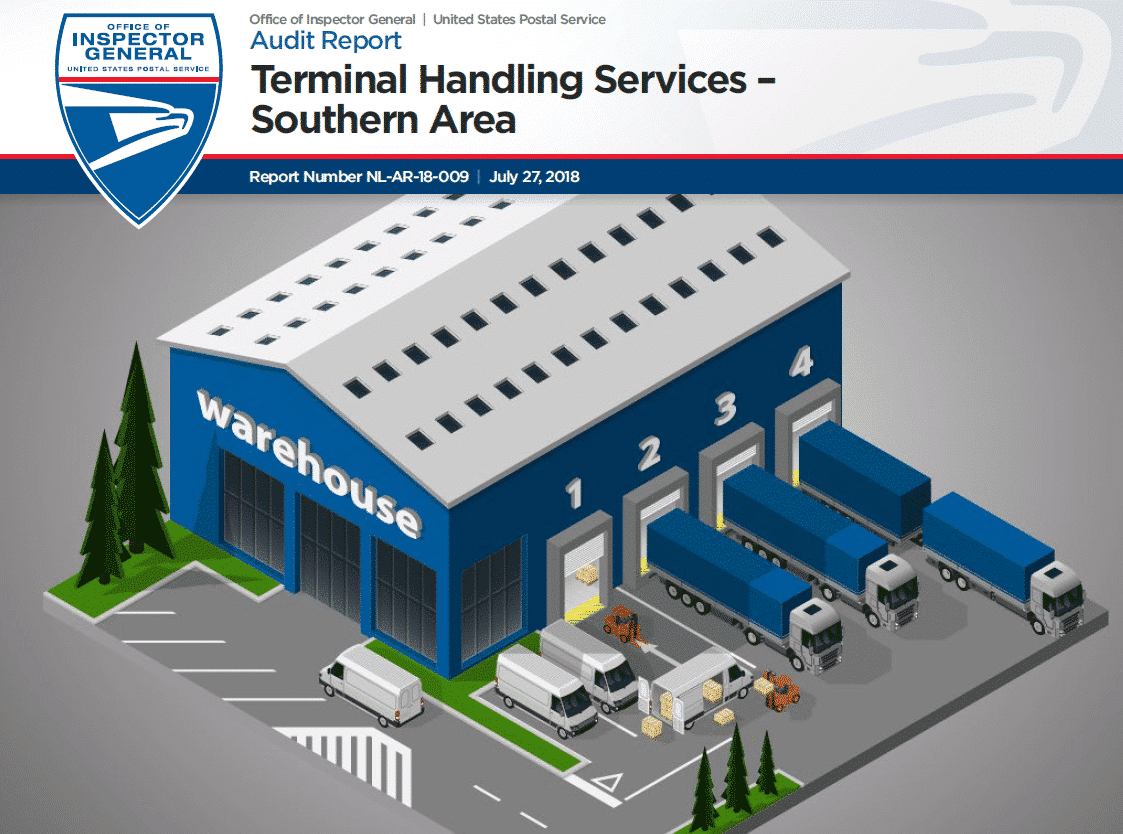
Objective
The objective was to assess the effectiveness of the Terminal Handling Services (THS) the U.S. Postal Service uses to sort and transport mail in the Southern Area. THS suppliers load mail into FedEx air containers and deliver them to FedEx for transportation across the nation. They also transport incoming FedEx air containers to THS facilities and load mail from the containers into mail transport equipment (MTE) containers for Postal Service pick-up and delivery to designated mail processing facilities.
There are 18 THS facilities in the Southern Area and an additional 51 nationwide. The annual cost for the FedEx contract is about $1.6 billion and the THS contracts over their contract terms total over $361 million. This is the second in a series of audits on the effectiveness of THS. We selected the Southern Area because it had over 203 million pounds of mail processed at THS sites in fiscal year (FY) 2017, the third highest national volume.
What the OIG Found
We found that the effectiveness of Southern Area THS could be improved with better oversight of mail arrival profiles and THS contractual operations. We visited the Dallas, Miami, and Tampa THS sites and observed:
- Postal Service mail processing facilities did not always adhere to the mail volume arrival profile (VAP) for the Dallas and Miami THS sites. The VAP is a mail volume percentage sent from mail processing facilities to THS sites. The headquarters Manager of Logistics said they are aware of VAP mail arrival issues. The Postal Service in January 2018 added permanent positions to the Network Operations Control Center to improve the monitoring of mail volume in Postal Service networks and included the monitoring of the VAP. The Manager of Processing Operations said that without this action VAP performance would have been even worse. When facilities do not comply with the VAP, there is an increased likelihood that mail will miss its FedEx flight. For example, in FY 2017, almost 270,300 pounds of mail missed scheduled FedEx flights for the Dallas and Miami THS facilities because of non-compliance with the VAP. This increases the risk of mail processing delays for the Postal Service and its customers.
- Dallas and Miami THS suppliers did not always meet the required mail delivery time to FedEx. This occurred because the Postal Service did not get the mail to the THS in a timely manner and the THS suppliers accepted mail after the cut-off time for loading full air containers. Although we observed missed delivery times, they did not result in air containers missing their FedEx flights; however, missing delivery times can increase the likelihood of missed flights.
- The Dallas THS loaded mail timely from FedEx flights into Postal Service MTE for transport to the mail processing facilities. However, the MTE remained on the dock for an excessive period of time. This occurred because the mail processing facilities did not provide necessary, timely transportation. This increases the risk of mail processing delays for the Postal Service and its customers.
- The three THS suppliers we observed did not always load mail into air containers according to THS contract requirements. The THS staff chose without Postal Service direction, to load mail based on their preference instead of contract requirements. As a result, the Postal Service paid FedEx almost $865,000 in FY 2016, and over $1 million in FY 2017 for unplanned mail sorting charges.
We concluded the conditions we observed occurred because the Postal Service did not have adequate THS contractual oversight. Postal Service representatives are supposed to coordinate operations, monitor performance, and ensure proper management of THS contracts. However, Postal Service staff at the Dallas, Miami, and Tampa THS facilities did not believe they had the authority to enforce contractual requirements. In addition, Postal Service Headquarters was not effectively using the performance irregularities to enforce the contract requirements. Specifically:
- THS suppliers self-reported contract performance irregularities that had liquidated damages; however, the Postal Service has not collected any liquidated damages. The Manager of Air Transportation, Category Management Center, said they currently have a THS irregularity process in place and expect to collect all outstanding liquidated damages by December 2018.
- The contract liquidated damage assessment formula for failing to load air containers is inconsistent with the liquidated damages definition. According to the contract, a liquidated damage would be assessed for all mail not loaded into air containers according to the contract. The assessment formula limits liquidated damage to mail that misses its FedEx flight. The Manager of Air Transportation, Category Management Center, indicated that the Postal Service is revising THS contracts so that the supplier requirements and liquidated damage assessment formulas agree. The target implementation date is December 2018. We are not making a recommendation on this because we have an open recommendation regarding this issue.
What the OIG Recommended
We recommended management:
- Ensure all Southern Area mail processing facilities follow their respective VAPs.
- Monitor and ensure that THS suppliers are following the THS contract for the loading of bypass and mixed mail air containers unless the Postal Service approves a deviation.
- Ensure that the THS contractual requirements are enforced.
Read full report
Source: USPS Office of Inspector General
